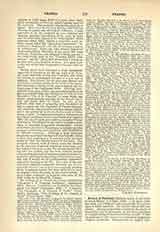

Francis of Fabriano, BLESSED, priest of the Order of Friars Minor; b. September 2, 1251; d. April 22, 1322. His birth and childhood were remarkable for evident signs of future sanctity. He was also gifted with rare talents. Having successfully completed the study of humanities and of philosophy, he asked for admission at a neighboring Franciscan convent, in 1267. Under the guidance of able masters he made rapid progress in religious perfection. Subsequently he applied himself to the study of theology, and devoted the remainder of his life to missionary labors in his native town and vicinity. As missionary Blessed Francis has become a shining example to the preachers of the Seraphic Order. He was a man of prayer and untiring study. In accordance with the words of the rule, “Ut sint examinata et casta eorum eloquia”, he was deeply convinced that the friars must announce to the faithful only well-grounded and authentic doctrine, in unambiguous and carefully sifted language. Ever mindful of this principle, Francis logically took a further step which has signalized him as a far-sighted and truly progressive member of his order. As a consequence of the extensive proportions theological studies had assumed since the time of St. Francis, the humble collections of biblical and patristic works, which were found in the early Franciscan communities, no longer met the demands of the student and preacher. Hence, Francis, heedless of any disapproving voice, promptly purchased with his father’s money a handsome library, the first on an extended scale established in the order. He loved to call it the “best workshop in the convent”, and its catalogue, mentioned by Wadding, contains numerous works of the Fathers, the masters of theology, biblical commentators, philosophers, mathematicians, and preachers, which shows that Francis was indeed, in this respect, quite abreast of his time. No wonder, then, that we find all his biographers in accord with Mark of Lisbon, who styles him a “most learned man and renowned preacher”. Of the writings of Francis Venimbeni little has been published. His “Chronica Marchii et Fabriani”, his “De veritate et excellentia Indulgentiai S. Marine de Portiuncula“, and the “Opusculum de serie et gestis Ministrorum Generalium”, all three probably forming one extensive chronicle, have unfortunately disappeared, save a few precious fragments bearing on the most salient questions of early Franciscan history. Besides several treatises of a philosophical, ascetical, and didactic character, he wrote an “Ars Praedicantium”, numerous “Sermons”, and a beautiful elegy on the death of St. Bonaventure. Despite his literary pursuits and manifold missionary occupations Francis found ample time for ascetical practices and works of an all-embracing charity. God testified he sanctity of His servanrt by many signs and miracles. His cult was approved by Pius VI in 1775.
THOMAS PLASSMANN.

